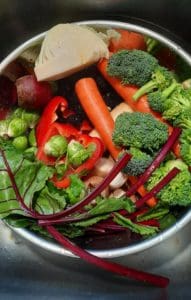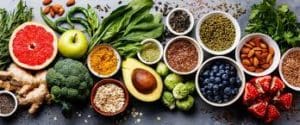Need to Poop? Add this, not that…
These Are the Worst Foods to Eat If You Need to Poop
Having trouble going number two? Avoid these foods that might only back you up more. Plus, get dietitian-approved tips to help make things easier.
Talking about poop may be something you used to giggle about (or maybe you still do), but constipation is no joke. The National Institutes of Health estimates that 16% of Americans are constipated, but about 1 in 3 Americans experience the not-so-fun symptoms. Constipation is technically defined as fewer than three bowel movements per week. But even if you don’t meet that criteria, you might feel constantly bloated, have trouble going or feel backed up.
If you’re having poop trouble, nutrition can play a key role (try these 8 foods dietitians eat when they feel constipated). Although if this has been going on for awhile or you don’t find relief with food and lifestyle changes, please talk to your doctor. What you eat is important and so is what you choose to skip. Here are some of the worst foods to eat if you’re feeling backed up.
Foods to limit
No food is going to completely stop you from going number two. But seeing as how most of us don’t eat enough fiber, it’s a good idea to limit rich foods that don’t have a lot of fiber when you need some help on the potty. Men should aim for 38 grams of fiber daily, women need 25 grams. The foods on this list have next to no fiber, so if you fill up on them, you won’t be getting the necessary fiber you need.
Highly-processed foods: cakes, cookies, crackers, pretzels, potato chips, french fries
Meat and seafood : red meat, chicken, pork, fish and seafood
Processed meat: bacon, sausage, cold cuts
Cheese and dairy: Cheese, ice cream, milk
Refined grains: white bread, white rice, white pasta
Popular low-carb diets, especially the ultra-low-carb ketogenic diet, cut out a lot of sources of fiber from whole grains, fruits and vegetables (constipation is a common side effect of the keto diet). If you’ve recently started a low-carb diet make sure that you’re eating lots of vegetables (and truthfully, I’d advise you to eat some whole grains and legumes too).
Something else you’ll want to watch out for? Drinking too much alcohol. Alcohol can be dehydrating, which isn’t helpful when you’re trying to be more regular (learn more about what alcohol does to your body).
It might feel overwhelming to think about reducing these foods, but simple trade-ups can help you boost your fiber intake. Try swapping meat for black beans in tacos, use whole-grain corn tortillas instead of white flour tortillas and top your tacos with lettuce, guacamole and pico de gallo. Eat oatmeal instead of a muffin for breakfast. Make your own “nice cream” with fresh fruit.
Foods to eat more 
High-fiber foods
- Fruits
- Vegetables
- Beans
- Whole grains
- Nuts
- Seeds
The key here is to make sure you’re adding these foods in slowly and drinking plenty of water. You don’t want to go from 0 to 60 too quickly. Try our high-fiber meal plans to get ideas of how to work more fiber into your day and check out these natural remedies for constipation.
What else can help you go?
Moving your body and staying hydrated are both very important. If you find yourself sitting all day, take short walk or stretch breaks.
Some people also swear by their Squatty Potty (starting at $24.99, bedbathandbeyond.com) which elevates your feet when you go so you’re in more of a natural squat position. According to the company, it can help you empty your bowels more fully and decrease straining. Adding one to your bathroom might be worth a shot.
Bottom line 
If you’re having poop troubles—it doesn’t always mean you need more bran cereal and less cheese. They might be related to stress, medication, IBS or another chronic condition. Some doctors may recommend trying an elimination diet or a FODMAP diet, but you should talk to a healthcare provider first to learn more about if that’s the right fit for you.
In general though, fiber does a body good. You’ll not only have better poops, but fiber is beneficial for heart health, helps lower your diabetes risk and may help you maintain a healthy weight.
Welcome to The Beet. A weekly column where nutrition editor and registered dietitian Lisa Valente tackles buzzy nutrition topics and tells you what you need to know, with science and a little bit of sass.
From Eatingwell.com written by Lisa Valente, M.S., RD Reviewed by Dietitian Victoria Seaver, M.S., RD May 07, 2020
